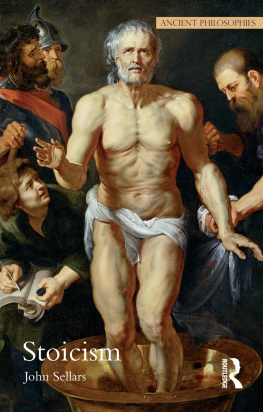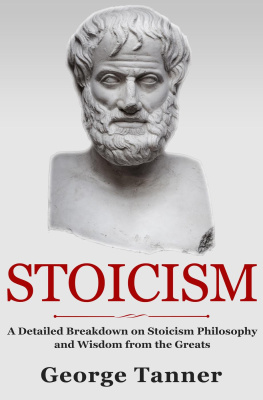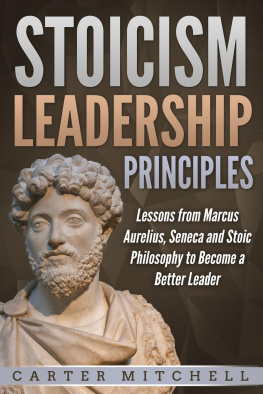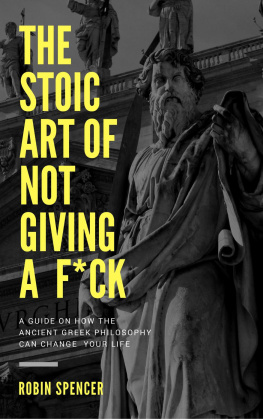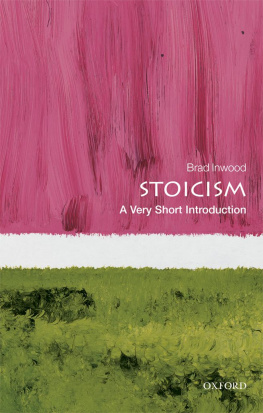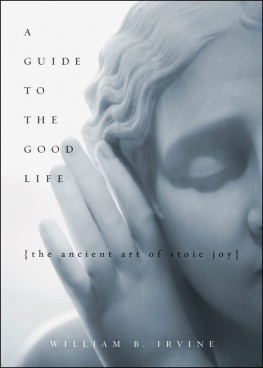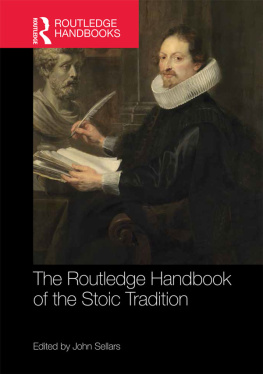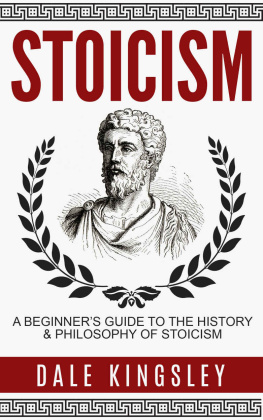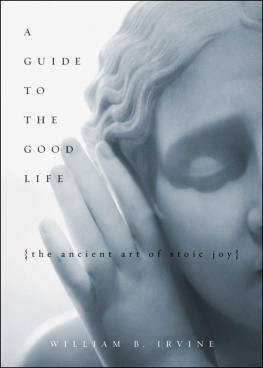Stoicism
Ancient Philosophies
This series provides fresh and engaging new introductions to the major schools of philosophy of antiquity. Designed for students of philosophy and classics, the books offer clear and rigorous presentation of core ideas and lay the foundation for a thorough understanding of their subjects. Primary texts are handled in translation and the readers are provided with useful glossaries, chronologies and guides to the primary source material.
Published
The Ancient Commentators on Plato and Aristotle
Miira Tuominen
Ancient Scepticism
Harald Thorsrud
Cynics
William Desmond
Epicureanism
Tim O'Keefe
Neoplatonism
Pauliina Remes
Plato
Andrew S. Mason
Presocratics
James Warren
Stoicism
John Sellars
Forthcoming
Classical Islamic Philosophy
Deborah Black
Confucianism
Paul R. Goldin
Indian Buddhist Philosophy
Amber Carpenter
Stoicism
John Sellars
First published 2006
by Acumen
Published 2014
by Routledge
2 Park Square, Milton Park, Abingdon, Oxon OX14 4RN
711 Third Avenue, New York, NY 10017, USA
Routledge is an imprint of the Taylor & Francis Group, an informa business
John Sellars, 2006
This book is copyright under the Berne Convention.
No reproduction without permission.
All rights reserved. No part of this book may be reprinted or reproduced or utilised in any form or by any electronic, mechanical, or other means, now known or hereafter invented, including photocopying and recording, or in any information storage or retrieval system, without permission in writing from the publishers.
Notices
Practitioners and researchers must always rely on their own experience and knowledge in evaluating and using any information, methods, compounds, or experiments described herein. In using such information or methods they should be mindful of their own safety and the safety of others, including parties for whom they have a professional responsibility.
To the fullest extent of the law, neither the Publisher nor the authors, contributors, or editors, assume any liability for any injury and/or damage to persons or property as a matter of products liability, negligence or otherwise, or from any use or operation of any methods, products, instructions, or ideas contained in the material herein.
ISBN: 978-1-84465-052-1 (hardcover)
ISBN: 978-1-84465-053-8 (paperback)
British Library Cataloguing-in-Publication Data
A catalogue record for this book is available from the British Library.
Designed and typeset in Minion.
Dedicated to the memory of Gloria Walker, a true Stoic
Contents
Stoicism was one of the most influential schools of philosophy in antiquity and its influence has persisted to the present day Originating in Athens around 300 BCE, it proved especially popular in the Roman world, while more recently it has influenced thinkers as diverse as Montaigne, Kant, Nietzsche and Deleuze. Stoicism offers a distinctive and challenging view of both the world as a whole and the individual human being. It conceives the world materialistically and deterministically as a unified whole, of which we are all parts. It presents the human being as a thoroughly rational animal, for whom violent emotions are actually the product of errors in reasoning. In the popular imagination it is now mainly associated with the ideas of emotionless calm and heroic endurance in the face of adversity. As we shall see, like so many popular images this one is based on an element of truth combined with an unhappy distortion.
The aim of this volume is to offer an introduction to Stoic philosophy for readers new to Stoicism and it does not assume any knowledge of either ancient philosophy or philosophy in general. It should be of use to students of philosophy, students of classics and other interested general readers. As well as outlining the central philosophical ideas of Stoicism, one of its aims is to introduce the reader to the different ancient authors and sources that they will encounter when exploring Stoicism. The range of sources that are drawn on in the reconstruction of Stoic philosophy can be bewildering for the unsuspecting beginner. This, in part, reflects the fact that the works of the early Stoics are almost completely lost, save for fragments reported by others and summaries of their ideas by, often hostile, critics. Works by later Stoics writing in the Roman period - the most famous being Seneca and Marcus Aurelius - do survive, but these have often been deprecated as unoriginal and limited to practical ethics. In this introduction I shall pay equal attention to what we know about the early Stoics and the surviving texts associated with the later Stoics.
offers a brief sketch of the later impact of Stoicism on Western philosophy. At the end of the volume there is a detailed guide to further reading.
It goes without saying that in an introduction of this sort some topics have been omitted and others dealt with only briefly It has not been possible to discuss competing interpretations of some points, and the treatments here will inevitably appear somewhat superficial to those already well acquainted with the ancient sources and scholarly literature. I do not claim that the interpretations that I offer here are definitive and part of the reason for supplying a fairly detailed guide to further reading is to encourage readers to explore other accounts of Stoic philosophy for themselves. If readers are suitably inspired to delve further into the subject then this volume will have served its purpose well.
This volume was written during the tenure of a Junior Research Fellowship at Wolfson College, Oxford, and I should like to record my thanks to the President and the Fellows for welcoming me into their community Much of the preparatory work coincided with my delivery of lectures on Hellenistic philosophy at King's College London in 2004-5, and I should like to acknowledge my co-lecturers on that course: M, M. McCabe, Verity Harte and Peter Gallagher. I should also like to thank Steven Gerrard at Acumen for all his work on my behalf, as well as three anonymous readers who supplied detailed and constructive comments on an earlier draft. Kate Williams has been an excellent copy-editor. As ever, I would not have completed this volume at all without the support of Dawn.
John Sellars
The following texts are the principal ancient sources for Stoicism, although naturally the list is by no means exhaustive. It also serves as a guide to the abbreviations used in this volume. Full bibliographic details of the editions used may be found in the Guide to Further Reading. A complete list of texts cited in this volume may be found in the Index of Passages.
- Aetius De Placitis Reliquiae, in H. Diels, ed., Doxographi Graeci (Berlin: de Gruyter, [1879] 1965)
- Alexander of Aphrodisias in Top. = in Topica ( Commentary on Aristotle's Topics ) Mixt. = De Mixtione ( On Mixture )
- Arius Didymus Epitome of Stoic Ethics, cited by the paragraph sections of Stobaeus, Anthology, bk2 ch. 7, printed in Pomeroy s edition and in Inwood and Gersons Hellenistic Philosophy.
- Aulus Gellius NA = Noctes Atticae ( Attic Nights )
- Calcidius in Tim. = in Timaeus ( Commentary on Plato's Timaeus )
- Cicero Acad. = Academica ( Academics ) Div. = De Divinatione ( On Divination ) Fat. = De Fato ( On Fate ) Fin. = De Finibus ( On Ends ) ND = De Natura Deorum ( On the Nature of the Gods ) Parad. = Paradoxa Stoicorum ( Paradoxes of the Stoics ) Tusc. = Tusculanae Disputationes ( Tusculan Disputations )

